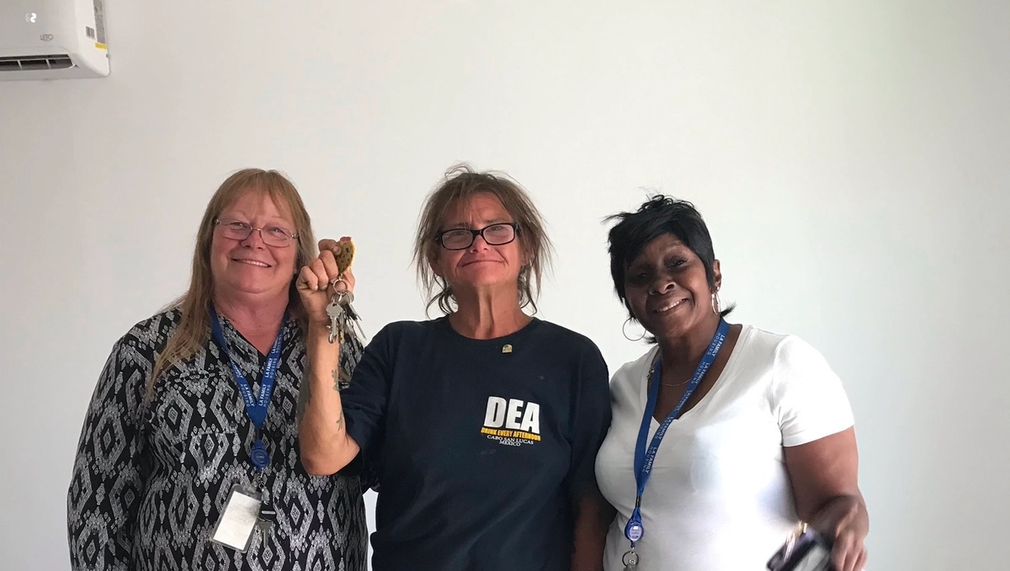Online Platform for People Experiencing Homelessness to Find Housemates
There are more people experiencing homelessness in Los Angeles County than ever before, yet there is simply not enough affordable housing to stem the tide--particularly studios and one-bedroom units. LA Family Housing launched an innovative web-based platform that efficiently and effectively matches potential housemates for shared housing. Generating housing matches at a much larger scale than an individual case worker can, this pilot program moves more people facing homelessness into stable, affordable homes across Los Angeles.

What is the primary issue area that your application will impact?
Housing and Homelessness
In which areas of Los Angeles will you be directly working?
San Fernando Valley
County of Los Angeles
In what stage of innovation is this project, program, or initiative?
Pilot or new project, program, or initiative
What is your understanding of the issue that you are seeking to address?
In Los Angeles County, a dearth of affordable housing options combined with rising inflation and the economic fallout from COVID-19, decades of disinvestment in our social safety net, and the continued effects of systemic racism are causing more people than ever to fall into homelessness. In 2020 even before the pandemic, 66,433 people were experiencing homelessness in LA County on any given night. The limited housing stock that is available is unaffordable for lower-income communities. A 2021 report revealed that the Fair Market Rent for a one-bedroom apartment in California is $1,615. To afford rent and utilities at this level, a renter earning minimum wage would need to work 2.2 full-time jobs. Historically, people with housing vouchers seek to secure a one-bedroom or studio unit. Across the country, the severe shortage of one-bedroom and studio units is made worse in large cities like Los Angeles where competition for available units prevents voucher-holders from being considered.
Describe the project, program, or initiative this grant will support to address the issue.
At a time when affordable housing is unprecedentedly inaccessible, shared housing—when two or more unrelated people split the cost of rent and live together under separate leases—is an effective tactic to move more people out of homelessness and into stable housing. Thoughtfully and successfully matching potential housemates up to this point has not been easy, requiring cumbersome manual analysis from case workers and constant cross-agency coordination. LAFH created a web-based tool, A Room of Your Own (AROYO), used by providers across the county to advance shared housing and help move more people off the streets. Participants and case workers fill out a questionnaire online about their lifestyle and housemate preferences to better understand their housing needs. A carefully constructed algorithm matches participants who are experiencing homelessness with viable housemate candidates, and service providers work with them to identify multi-bedroom units. In the next phase of this project, we will improve the application with a new web developer, Strategic Platforms, Inc. to hone match functionality and expand AROYO across more service providers, increasing the number of potential housemates in the system. We will build out our capacity through hiring Shared Housing Coordinators to facilitate meetings between matches and handle more clients at once, as well as Shared Housing Locators to increase the properties available for shared housing as AROYO increases matches.
Describe how Los Angeles County will be different if your work is successful.
Amid a housing shortage in L.A. County, shared housing is both a short- and long-term solution. By capitalizing on the existing stock of multi-bedroom housing units in the region, we can not only avoid lengthy construction timelines and provide more immediate housing for more people experiencing homelessness, but also lower their cost of living. Beyond the cost savings and ability to move multiple people into housing at one time, shared housing can have extraordinary social, mental, and emotional benefits and can be a pathway to independent living for people transitioning out of homelessness. In effective shared housing programs across the country, more than 85% of clients placed in shared housing experience long-term success, according to the Shared Housing Institute. By advancing shared housing across L.A. County, AROYO will help improve some of the most pressing issues currently facing Angelenos and exacerbated by the pandemic: homelessness, mental health and financial insecurity.
What evidence do you have that this project, program, or initiative is or will be successful, and how will you define and measure success?
In the first phase of the pilot, we introduced AROYO to three key partners in the region, which more than doubled our client input. We newly entered 114 clients into the program and successfully matched and housed at least a dozen individuals. As we scale up these efforts in the next phase of the pilot, we expect this 11% match rate to exponentially increase. The more data in AROYO, the more potential for successful matches. Simultaneously, we are working to train more case workers in AROYO, improve public perception of shared housing, and incentivize landlords to increase shared housing properties. Success will be measured by the number of clients input into AROYO, number of successful matches, and number of people housed, as well as client satisfaction and improvements in data measured through the county-wide Homeless Management Information System (HMIS), such as the Vulnerability Index-Service Prioritization Decision Assistance Tool (VI-SPDAT) scores and housing retention.
Approximately how many people will be impacted by this project, program, or initiative?
Direct Impact: 275
Indirect Impact: 66,433